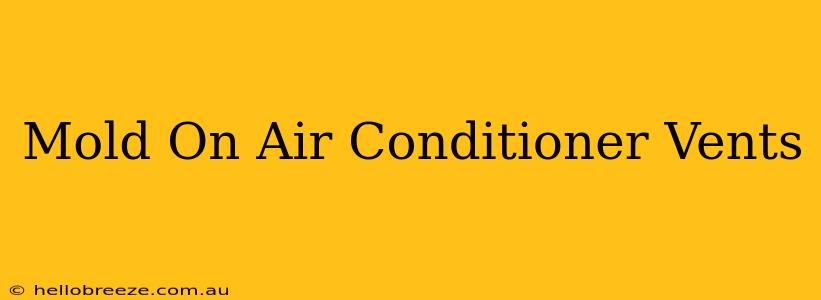Mold growing on your air conditioner vents is a serious issue affecting indoor air quality and potentially your health. This unsightly and potentially hazardous problem needs immediate attention. This guide will cover the causes of mold growth, effective prevention strategies, and safe removal methods.
Understanding the Causes of Mold on Air Conditioner Vents
Mold thrives in damp, dark environments, and your air conditioner vents can unfortunately provide the perfect breeding ground. Several factors contribute to mold growth:
1. High Humidity:
Air conditioners remove moisture from the air, but condensation can accumulate within the vent system, especially if the system is old or poorly maintained. This excess moisture creates an ideal environment for mold spores to germinate and grow.
2. Poor Ventilation:
Insufficient airflow in your home can lead to moisture buildup, increasing the risk of mold growth in your air conditioner vents and other areas.
3. Leaks and Water Damage:
Leaks in your air conditioning system, or even water damage from other sources near the vents, can provide a continuous source of moisture, fueling mold growth.
4. Dust and Debris:
Accumulated dust and debris on and around air conditioner vents create a perfect hiding place for mold spores, providing food and a surface for growth.
Preventing Mold Growth on Air Conditioner Vents: Proactive Measures
Preventing mold is far easier than dealing with a full-blown infestation. Here are some crucial preventative steps:
1. Regular Cleaning:
Regular cleaning of your air conditioner vents is essential. Use a vacuum cleaner with a brush attachment to remove dust and debris. For more stubborn mold, consider using a damp cloth with a mild cleaning solution (but avoid harsh chemicals).
2. Improve Air Circulation:
Ensure adequate ventilation in your home by using exhaust fans in bathrooms and kitchens, opening windows when appropriate, and checking for any blockages in your ventilation system.
3. Address Leaks Promptly:
Fix any leaks in your air conditioning system or plumbing immediately to prevent moisture buildup. If you suspect a leak in your AC, consult a professional.
4. Regular AC Maintenance:
Schedule regular maintenance checks for your air conditioning unit. A professional can identify potential issues before they lead to mold growth. Proper maintenance helps prevent moisture problems.
5. Use a Dehumidifier:
In particularly humid environments, consider using a dehumidifier to reduce moisture levels in your home. This helps create a less hospitable environment for mold.
Removing Mold from Air Conditioner Vents: A Step-by-Step Guide
If you already have mold on your vents, don't panic! However, never attempt to remove large or extensive mold colonies yourself. Mold can release spores that can worsen allergies and respiratory problems. For large infestations, always call a professional mold remediation specialist.
For small areas of mold, you can try these steps:
- Safety First: Wear protective gear, including gloves, a mask, and eye protection.
- Prepare the Area: Protect surrounding surfaces with drop cloths or plastic sheeting.
- Gentle Cleaning: Use a solution of warm water and mild detergent. Apply it to the affected area and gently scrub with a soft brush.
- Rinse and Dry: Thoroughly rinse the area with clean water and allow it to dry completely. A fan can help speed up the drying process.
- Disposal: Dispose of cleaning materials and any moldy debris carefully according to local regulations.
Important Note: If the mold returns quickly or spreads, or if you experience any health issues after cleaning, contact a professional mold remediation company. They have the expertise and equipment to safely and effectively remove mold infestations.
Conclusion: Breathe Easy with Mold-Free Vents
Mold on your air conditioner vents is a problem that requires attention. By understanding the causes, implementing preventative measures, and addressing existing mold correctly, you can create a healthier and more comfortable living environment. Remember, prevention is key, but when in doubt, consult a professional for assistance. Your health is worth the investment.

